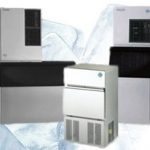

Choose the Right Ice Maker for Your Bar and Restaurant
A commercial ice maker is a valuable addition to your bar, restaurant or catering establishment. Keeping a reliable and consistent source of ice is essential to a professional kitchen.
Size of Ice Maker
Ice makers can be reasonably priced, and can fit into any space in your kitchen. A good quality ice maker will be efficient and reliable.
They also produce better quality ice than ice produced in freezers at home. Instead of storing ice next to food, which can affect the taste of the ice, ice machines produce ice independently.
The amount of ice the ice maker will be required to make is important when choosing your machine. Each business and catering establishment is different, so there is not one size that suits all. Research how much ice is used during your busiest periods, and ensure you have enough ice produced for each season. As a rough guide, 7-10oz beverages will need around 17kg per 100 drinks and 12-16oz beverages will need approximately 27kg per 100 drinks.
Location and placement is a vital consideration. The ice storage bin must be in an easily accessible location to prevent waste and save transportation time. The ice maker must also be close to an electrical and water supply.
Types of Ice
The type of ice you use and what it is used for in your restaurant or bar affects your choice of ice maker. Do you run a self-serve establishment or planning to sell high-end cocktails? Some machines specialise in producing gourmet, nugget or tube ice which is perfect for use in drinks. Ensure your ice choice suits the glasses you have at your bar or catering establishment.
Other machines produce flaked ice which is ideal for use as cold storage and storing and preserving food.
Each shape also has a different melting time; dice cubes have a slow melting time while shapes such as tube or flaked have a faster melting time. Some machines can also produce several different shapes.
Installation
Many machines can make ice within a few minutes. The user simply pours water into the ice maker and turns on the machine.
Commercial ice makers are designed for professional kitchens and are built with durability and strength in mind for constant, everyday use.
The majority of ice makers are fed by water mains and therefore need drainage, and connection hoses which are usually supplied.
The installation of a commercial ice maker is a similar method to installing a household washing machine, as an ice maker will require the same 13 amp plug, drainage outlet and mains water feed.
A scale reducer or water filter is recommended for use with your ice maker. These will reduce scale build up, therefore preventing any breakdown problems that could occur from limescale in hard water regions.
Installation should be carried out by a professional and qualified plumber. Ensure your chosen ice maker supplier provides comprehensive warranty cover to protect your purchase and ensure you have many months and years of successful ice production.


Validate your login
Login
Create New Account